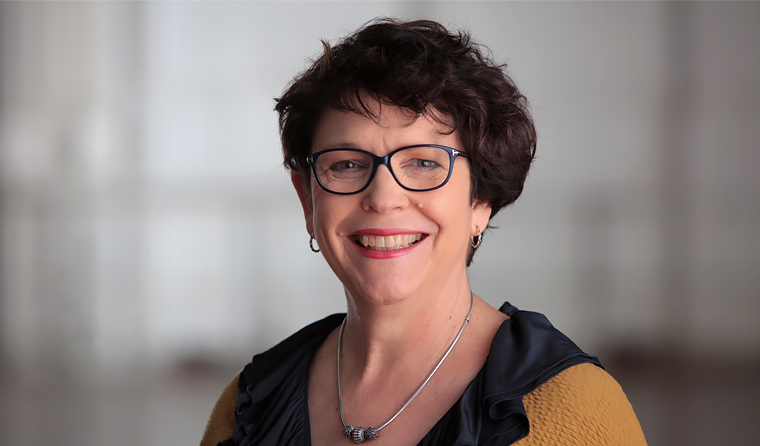News
Developing treatments and helping future generations through breast cancer trials
Clinical trials can develop new treatments and help beat breast cancer, according to the Breast Cancer Trials organisation.
 Cancer survivor Leslie Gilham says she volunteered to be part of a clinical trial so future generations could benefit from advanced treatments.
Cancer survivor Leslie Gilham says she volunteered to be part of a clinical trial so future generations could benefit from advanced treatments.
Leslie Gilham had accompanied a friend to a mammogram just to ‘hold her hand’.
But the visit led the mother-of-two to examine her own breast.
‘I came home that night and I thought, “Well, I haven’t done any self-examination for a while”,’ Ms Gilham told newsGP.
‘I found something that wasn’t really a lump … more like a thickening … but I thought I better get it checked out.’
Then 46, the business administrator was diagnosed with a lobular breast cancer in her right breast. Surgeons eventually found five tumours and Ms Gilham had a mastectomy.
Bouts of chemotherapy and radiation followed, but instead of going on the standard medication, her oncologist suggested she enter a clinical trial for a new drug.
Fran Boyle, Professor of Medical Oncology at the University of Sydney, is on the scientific advisory committee of Breast Cancer Trials, an international academic oncology research group based in Australia and New Zealand.
‘We interface with the international academic breast cancer trial groups in Europe and North America to collaborate to bring trials to Australia that are important for generating the kind of evidence needed to improve patient care,’ Professor Boyle told newsGP.
‘That might include testing drugs, but it might also include testing old drugs, de-escalation of treatment, new techniques of surgery, radiation and supportive care.’
Professor Boyle said about 15,000 women had been through the trials over a 40-year period. For a drug or surgery trial, patients are usually followed-up for a period of up to 10 years.
‘Often [a breast cancer trial] will be comparing new treatment with an old one, or in some of our trials actually reduce the amount of treatment that somebody might have – if their risk is thought to be low – based on a new test,’ Professor Boyle said.
‘So some of our trials might involve adding a new treatment, others might involve taking away old treatment but based on a new piece of science. And then you are usually comparing the outcome of the two groups.’

Professor Fran Boyle says GPs have a key role in helping patients make informed decisions about breast cancer trials.
Professor Boyle said the only way to bring new treatments to patients is to evaluate them in randomised trials.
‘It’s the only way that the drugs get on the PBS [Pharmaceutical Benefits Scheme], it’s the only way that new Medicare item numbers are approved based on evidence,’ she said.
Professor Boyle said no woman in a trial misses out on having the best standard of care.
‘All women in clinical trial are carefully followed-up and supported,’ she said. ‘So if the evidence changes during the time they are on the treatment, then they are informed about it and given the opportunity to change or withdraw. And if new side effects come to light then they will be informed of that.’
Trial participants can often be concerned about missing out on a current medical treatment, or being given a placebo.
‘They have a fear that if they, for instance, are in a trial which includes a placebo then that means they are going to be missing out on treatment all together,’ Professor Boyle said.
‘That would not be done in a breast cancer trial. A placebo would only be used as an add-on treatment, not a replacement treatment.’
Professor Boyle said GPs can assist their patients in making informed decisions about entering trials.
‘GPs can help patients to look through their information and consent forms and clarify any of the wording, to reassure them that they have the got the opportunity to ask questions, and to help the patients generate the questions that they want the answers to,’ she said.
‘And also to encourage them to look for cancer trial opportunities, particularly if their cancer has spread.’
Now cancer-free for nine years, Ms Gilham is glad she took part in the trial, which involved taking a new medicine for five years.
‘I have a daughter,’ she said. ‘The way it was told to me was, “It might not benefit you, but it might benefit others in the future”.
‘I had a girlfriend who was diagnosed prior to me and then was re-diagnosed at the same time as me, and unfortunately passed away.
‘It was all really fresh in my mind that we need to get better at this and anything that I could do to help was one of the main reasons I put up my hand to participate.’
October is Breast Cancer Awareness Month.
breast cancer Breast Cancer Awareness Month trials University of Sydney
newsGP weekly poll
Which of the following areas are you more likely to discuss during a routine consultation?